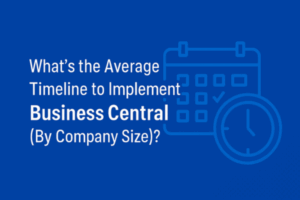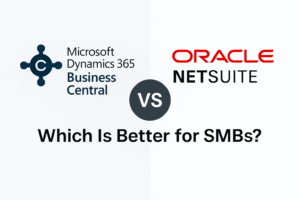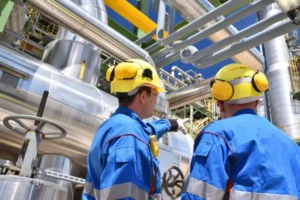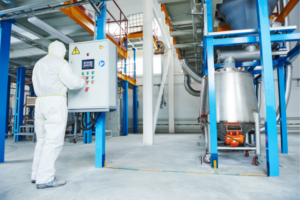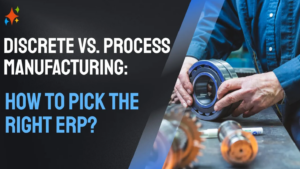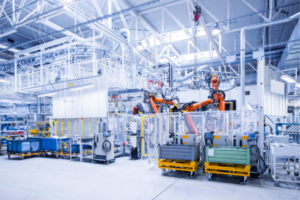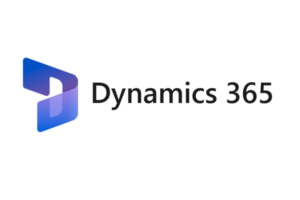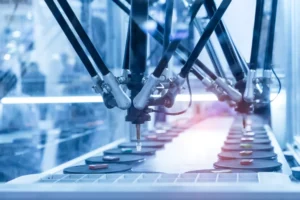What is Chemical Manufacturing ERP? Functions and Working
Let’s discuss what chemical manufacturing enterprise resource planning entails. This software can help a chemical production company streamline its operations and bring products much faster to the market. It also makes the whole manufacturing process a lot cheaper. Moreover, an ERP solution is an easy way to ensure compliance with industry regulations. This software will perform the following functions for your chemical production business:
- Auto-linking and scheduling batch jobs
- Managing deviations and non-conformances
- Automating hazmat shipping documentation
- Generating safety data sheets (SDS) and labels
- Optimizing resource utilization based on planning
- Tracking the progress of product samples and formulas
- Handling regulatory requirements like GHS, MSDS, HACCP
- Managing equipment and resource availability and capacities
- Maintaining a centralized database of compliance information
- Mandating quality data collection and task acknowledgements
In short, ERP solutions manage and integrate different business processes. In chemical manufacturing, you can use ERP software for production planning and inventory management, among other things. Also, a simple ERP tool will give you a centralized system to manage different aspects of running this business.
The Importance of Chemical Manufacturing Software
A recent article reviewed the Dutch chemical industry and realized that the industry still faced threats of going obsolete even after recovering from financial turmoil. Annual production levels were lower in the country and Europe’s moderate economic growth further depressed the chemical production industry. A curious glance at the Dutch chemical manufacturing niche shows why ERP solutions have become more than necessary today.
A case study of Saneesa Chemicals will be helpful here! This company started small but soon grew into a major chemical manufacturer. However, it couldn’t maintain control over its complex supply chain. As a result, the legacy systems began to fail in terms of visibility, and the company faced issues like:
- Difficulty tracking raw material lots
- Insufficient producing planning/scheduling
- Lack of real-time data for informed decision-making
However, the stakeholders decided to streamline everything via chemical manufacturing ERP. They used an ERP solution for accelerated product development, robust quality control, better cost management in the line of production, and smarter resource utilization. After implementing the chemical manufacturing ERP, Saneesa Chemicals achieved complete batch traceability, better production efficiency, enhanced quality control, and improved cost management.
Key Benefits of Chemical Manufacturing ERP Software
You may wonder how this ERP solution will help your company grow. You can see from the statistics we have shared above that the chemical manufacturing industry faces existential problems. These problems can be tackled successfully, however, only if you’re using ERP software. So, here are a few ways an ERP tool will help your organization expand into something larger:
- Formulation management: You’ll use an ERP solution to check the availability of raw materials. It can also show you the quantity required to meet sales forecasts. Moreover, you’ll manage all your formulations easily with this software, notifying suppliers and handling cancellations.
- Stock control: Chemical manufacturers can’t bear to run out of stock in this competitive niche. A simple ERP solution can help you check expiration dates, linking lots and batches for quality data control. The best way to keep an efficient supply chain is to invest in CM ERP.
- Improved collaboration: Thanks to this software, different departments will have access to real-time data. The integrated functions of this amazing tool will make contract management easier. That’s how you can prevent communication silos affecting different departments.
- Product innovation: When different departments share information, they’ll come up with new, innovative solutions to unique problems. ERP software makes this collaboration easier, ensuring that you folks have good relationships with vendors with lower procurement costs.
- Agile manufacturing: Real-time sales data will also give you immense supply chain flexibility. So, you’ll be able to manage production easily while meeting challenging industry demands. It’ll get much easier to adjust your manufacturing plans due to ERP’s data analytics features.
- Regulatory compliance: If you want to stay compliant in the chemical production niche, then it’s better to use CM ERP. It’ll ensure MSDS, OSHA, cGMP, and ISO9001 compliance by creating COA and SDS, among other forms of paperwork, to make your employees’ lives easier.
- Cost accounting: If you want accurate cost accounting for every LOT, chemist, and sales order, it is better to use enterprise resource planning software. ERP systems will reduce costs for you via procurement/planning schedule optimization, improving the efficiency of the supply chain.
- System customization: Different chemical manufacturers have varying needs. But an ERP meets all these diverse needs with amazing customization features. It can address the unique problems facing your company and you can customize it with the features that you actually need.
- Interactive dashboards: You can easily view and extract key business data by using interactive & user-friendly dashboards. ERP systems provide a single platform for accessing critical customer, supplier, and business data, enhancing decision-making.
- Easy deployment: Lastly, these solutions easily integrate with legacy systems. So, you can install chemical manufacturing ERP with minimal disruptions. However, the period of deployment of an ERP solution varies based on different factors (discussed in detail at the end of the article).
In the next section, we’ll discuss how to choose the perfect CM ERP for your company. You’ll learn some of the key factors to look for when investing in an ERP solution in this economy.
Choosing the Ideal Chemical Manufacturing ERP
The chemical manufacturing industry didn’t merely face a decline in the United States. Even in Europe, the industry struggled to justify production costs in 2023. A survey shows that EU27 chemical production, in those days, decreased by 8% compared to 2022. Now, the industry has made a comeback in 2024 due to sheer girth and dedication; however, it’s still not out of the woods yet. That’s why it’s necessary for you not to take unnecessary risks and choose only the best ERP solutions. Here are a few factors to consider when investing in a CM ERP tool:
- Basic functionalities: It’s a no-brainer that chemical manufacturing ERP must have all the basic, industry-specific functions expected to be found in a software solution like that. For instance, an ERP must have batch processing, quality control management, and other features.
- Integration capabilities: This software must also be able to integrate with existing software. So, you shouldn’t invest in an ERP solution that doesn’t work well with other software programs. It’s important for data sharing and streamlined operations to happen during this integration.
- User-friendliness: As stated above, ERP solutions happen to be very user-friendly. But not every worker is comfortable with every software solution! That’s why you should choose a tool that is easy for everyone to use and also offers ample training to make sure your crew will make sense of it quickly. Choose an ERP with a modern interface and navigation-friendliness.
- Scalability: You should only invest in a software solution that can grow with your manufacturing company’s evolving needs. It must be capable of handling increased users and transactions. So, an ERP that can’t adapt to the evolving business needs of your CM organization.
- Production management: Only purchase an ERP solution that can track lot characteristics. Also, an ideal ERP software program has dynamic formula adjustments based on real-time data. That leads us to the last entry on this list, i.e., robust analytical features.
- Data analytics: You need an ERP tool with excellent business intelligence (BI) tools that’ll let you extract key business insights from raw data easily. Also, you should expect this software solution to have forecasting/planning functionality to anticipate market demands.
In short, you should choose the right chemical manufacturing ERP that addresses these factors, helps streamline operations, improves quality, ensures compliance, and drives overall business success. Now, the subsection you’ll read will explore the key features of chemical manufacturing ERP so you can realize the quality standards of the enterprise resource planning tool of your choice.
Major Features
Hopefully, you now understand how to choose an ideal CM ERP for your business. However, we’d like to explore the key features of this software solution in detail. If you are looking for the best ways to bolster your chemical manufacturing company’s profitability, then you should invest in an ERP. The best ERP out there will surely have these capabilities:
- It’ll manage formulations and help you track the availability of raw materials
- You can do root cause analysis with this tool and capture critical production data to make better business decisions
- It should provide you with safety data sheets (SDS) so you can meet state/federal requirements
- It will help you link quality data to lots for complete traceability and perform quality checks at a lot of different stages of production
- This tool will optimize production plans based on available capacity and demand forecasts
- What’s even more exciting is how you can easily execute production tasks via mobile devices for real-time updates
- This tool will let you track inventory based on expiry dates and storage locations
- A key feature of CM ERP is backflushing inventory automatically upon production completion
- You might use it to run “what-if” cost analysis scenarios and define labor costs within production specifications
- Moreover, this ERP software will take care of ISO, GHS, MSDS, and HACCP regulations for you
- It’ll automate hazmat shipping documentation and maintain a centralized database of the most vital compliance information
- It’ll give you interactive dashboards for business insights and enable demand forecasting as well as scenario planning
Did you know that the market for chemical manufacturing software stands at almost $6 billion today? It is expected to exceed $15 billion by 2031, as per recent estimates. That’s why you must start installing a chemical manufacturing enterprise resource planning tool right away. Don’t know how to implement an ideal ERP in your organization successfully? Don’t worry; in the next section, we’ll explain it all to you in a few subheadings. It’ll help you organize your company’s efficiency successfully.
How to Implement Chemical Manufacturing ERP Software?
“The American Chemistry Council expects that capital spending for the US chemical industry will remain mostly unchanged year over year in 2024 before ramping up to a growth rate of 3%–4% annually in 2025–2026.” (Yankovitz et al., 2023)
If you want to implement an ERP software solution in your chemical-producing company, then you will have to follow these steps:
Evaluate Your Current Needs
Like all ERP software solutions, you should start by assessing your needs. What are your pain points? It is impossible to implement an ERP tool successfully without recognizing the critical capabilities that your organization needs from it. Also, determine the scope of this implementation process. Do you require a full-scale implementation? Or are you focusing only on specific functions?
Choose an Ideal Solution
Now, you’ll choose an ERP tool that aligns with your current needs. Make sure that you’re working with an experienced vendor who understands the pain points of your industry. Also, look for:
- Industry-specific functionality
- Integration capabilities
- Track record of successful implementation
Demos will help you better understand whether this ERP system meets your needs.
Plan the Roadmap
In the third phase, you will develop a detailed roadmap with clear milestones for ERP implementation.
As you can see, this step involves identifying and involving all major stakeholders. Take all departments, employees, and other key individuals in confidence. You’ll also have to establish a change management strategy to address the workforce’s concerns.
In the end, you’ll choose a robust data migration approach. Then, you’ll prepare your legacy systems and data for the transition. It’ll take us to the fourth phase of our CM ERP journey.
Configure the ERP
It’s time for you to start working with the ERP vendor to customize the system to match your needs.
You’ll have to configure the ERP modules and user interfaces based on your company’s unique needs. In this very stage, you’ll start integrating this tool with all your existing systems, such as accounting and lab instruments. Don’t forget to create custom reports and dashboards to meet your information needs too. That’s how we’ll move on to the second-last stage of this process.
Test the ERP System
Here, you’ll perform comprehensive, rigorous testing of the ERP tool. Consider these three tests:
- Functional
- Integration
- User acceptance
Also, validate data integrity, process flows, and regulatory compliance during the testing phase. Identify and resolve any issues or bugs before the final go-live.
Roll Out the ERP System
In the end, you’ll have to do the following:
- Train the end-users on the chemical manufacturing ERP’s functionality and workflows.
- Have a support structure in place with the vendor to receive post-installation caregiving
- Monitor the system performance and user adoption closely during the initial go-live period.
- Continuously optimize the ERP system based on user feedback and evolving business requirements
That’s all that you need to embark on the pathway of CM ERP implementation.
The Cost of Implementation
You may wonder how much ERP implementation costs. If you’re purchasing out of the box solutions, they will cost you around $50,000 to $100,000 depending on the size of your business (maintenance fees are 20% of the initial cost of installation). However, an ERP solution that’s customized for your company’s unique needs may cost up to $500,000 on a good day (or more if you want user training and go-live support).
The Duration of Implementation
How long does it take to implement CM ERP in your company? It depends on various factors. In short, it depends on the size of your organization, customization level, and two more factors described here:
- Company size: Small CM companies may implement ERP in 6 to 12 months. However, larger and multinational organizations often require 1 to 2 years for successful ERP implementation.
- Customization level: If you have developed a custom ERP solution from scratch, then you should dedicate 12 to 35 months to the whole endeavor.
- Cloud features: A cloud-based system requires 3 to 6 months of implementation time.
- Migration: ERP upgrades also take 3 to 6 months of implementation, especially if your older ERP solution is similar to the new one.
Now, you can see that the timeframe for ERP implementation depends upon multiple factors.
Final Thoughts
In short, chemical manufacturing ERP will help you streamline business operations. That’s why you must implement an ideal ERP solution in your organization right away. That’s how you can make waves in this niche of chemical production and excel at producing quality products with 99.99% efficiency.
So, become proactive instead of reactive to keep up in this ever-evolving industry. Feel free to schedule a discovery call with the experts at Alchemy 365 to see how we can be your ERP partner of choice when it comes to finding and implementing an ideal solution. So, choose a software option that aligns with your unique business needs to set your company up for sustainable growth and profitability.



